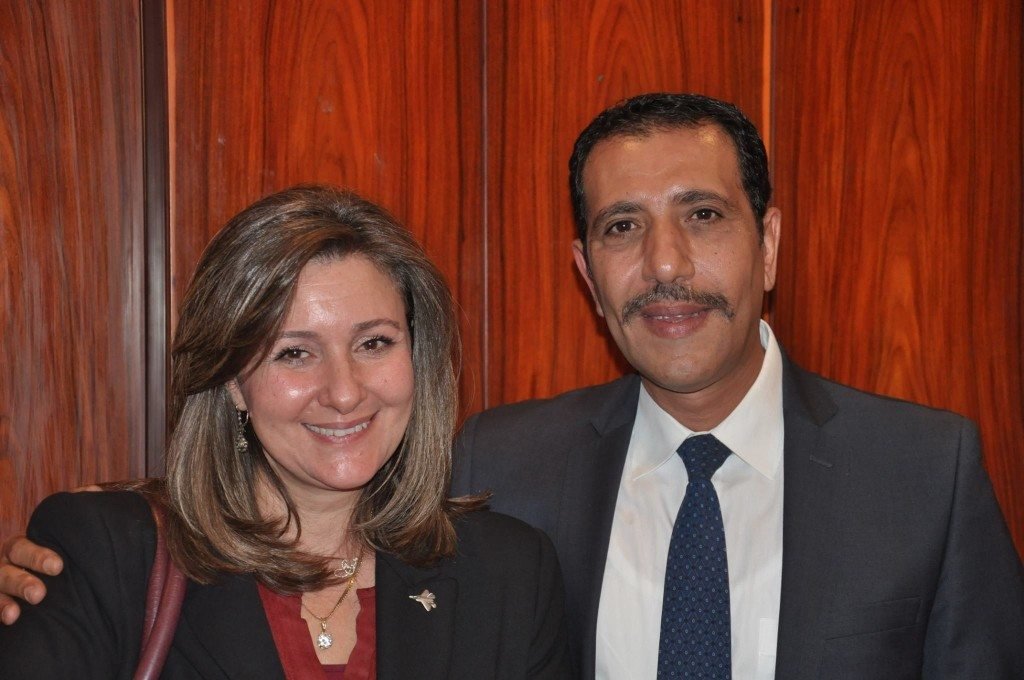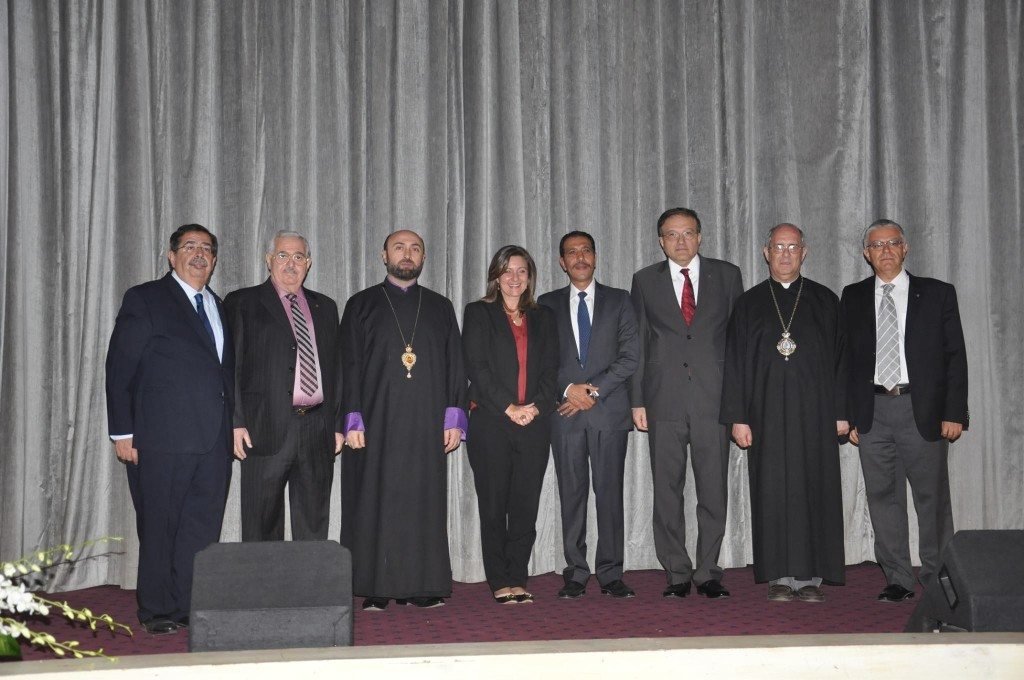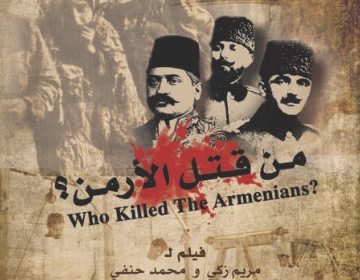Special for the Armenian Weekly
Last month, both Egyptians and the Armenian community in Egypt had the chance to watch the first screening of “Who Killed the Armenians?”—the first documentary film of its kind produced in Egypt and dedicated to the Armenian Genocide. The Arabic-language documentary was prepared by Egyptian satellite TV anchor Myriam Zaki and filmmaker Mohamed Hanafi.

The screening took place in Heliopolis Library and was organized by the Armenian Patriarchate’s Cairo Committee of the Centennial of the Armenian Genocide. A welcome speech was given by Armen Mazloumian, a committee member and representative of the “Hay Tahd” office in Egypt. Mazloumian shed light on the various stages of the genocide and its reasons. He stressed the positive role Egypt played during the genocide, including its warm welcome of survivors and orphans of the genocide on Egyptian land. Mazloumian thanked the filmmakers for their dedication to the Armenian Cause.
The 70-minute film was shot in Armenia, Egypt, and Lebanon. It presents several documents collected from the archives of the countries visited—documents that prove the Ottoman Turks’ barbaric acts against the Armenian nation, beginning with the Hamidian Massacres (1894-1896), the Adana Massacre (1909), and ending with the 1915 genocide. Those documents were revealed to the Arab audience for the first time.
The film also includes testimonies of survivors of the genocide, especially from the Davtashen district. It features interviews with Armenian and non-Armenian public figures, activists, genocide scholars, lecturers, and clergymen, such as Richard Hovannisian, Vera Yacoubian, Haig Demoyan, Mohamed Refaat Al-Imam, Rupen Safrasdian, Ashod Melkonian, Taner Akçam, Catholicos Aram I, and Catholicos Karekin II.
According to Zaki and Hanafi, it took 10 months to produce the documentary and 600 hours in preparation time. Armenian music is heard throughout the film—including Gomidas’s “Groung” and “Dle Yaman” masterpieces—in addition to Zaki’s touching voice.
The Armenian Weekly recently conducted a short interview with Myriam Zaki on her and Hanafi’s motivations for producing a documentary on the genocide, and its importance to a Muslim country like Egypt.
***
N.K.: What inspired you and Mohamed to focus on such an issue, the Armenian Genocide, and to produce this documentary?
M.Z.: Reflecting on the Armenian Genocide was a way of understanding our own history and introspecting with a deeper sense of identity. The Arab Spring, which was by no means rosy except for its color of blood on Arab lands, forces us to re-evaluate. Many masks have fallen in the last few years; it is always our duty to search for the “truth.”
This year coincided with the Centennial of the Armenian Genocide. We made an episode on our daily show “Ala El-Hawa” (On Air) on the subject as part of a series of episodes on the role of the Ottoman Empire in Arab lands. The information we received on air from our group of guests was very disturbing. It is then that Mohamed and I realized that this particular subject needed further study, especially because we learned very little in our textbooks on the subject of the Ottomans.
Egypt’s semi-autonomy from the Ottomans and its self-absorbance in its own processes turned many of us color-blind to the neo-Ottoman ideology looming over the current government in Turkey. Hence, we felt it was up to us to search and to unveil the history of the Armenian Genocide to the Arab public, a subject kept under so much silence for 100 years. Had we been educated properly in our own history, we would have been better prepared to understand and ultimately face the last few years—and certainly it would have saved many lives! I would also like to add that putting a cover on wounds is no solution, it only festers… One must face reality, whatever it is.

N.K.: Did you face difficulties during the preparation of the documentary? If yes, what were these difficulties?
M.Z.: Of course we did. The first difficulty was to figure out the “why.” Why would a nation do this to its own people? The second difficulty was to figure out the “how.” How can a government do this to its own citizens! The third difficulty for me was to deal with the images and detailed accounts of human suffering and the cold bloodedness of the group of perpetrators in executing their genocidal policies…
Impunity was also very disturbing…that in itself is a subject of study. … The language barrier was a surmountable challenge. Aside from all this it was important to think deeply on how to present the subject. We could have taken many angles in our documentary, as it is a subject that deserves much more [attention]. We felt, however, that the story had to be told based on the documents and released archives.

N.K.: How do you think such a production be of importance to a country like Egypt?
M.Z.: This production is important not just to Egypt but to the whole Arab world. Armenians are part of our land and history. We share an important part of history. To draw some parallels: When you share a common invader you face the same strategy. In the search process, we learned that when Selim the First [Ottoman sultan from 1512-1520] invaded Egypt he wanted to ethnically cleanse it of Copts, he wanted to send some of us to the south of Egypt! It is the Muslims of Egypt and Al-Azhar who stood up fiercely to his plan. This is an important lesson that says a lot about this nation and the identity of its people. I think we are at a stage where we must look at the facts whatever they are, and seriously discuss concepts if we plan to face the challenges of today.
One hundred years of silence is more than enough, and the price is there in front of our own eyes.
***
Zaki believes that the information presented in each and every segment of the documentary deserves a film of its own. She is hopeful that “Who Killed the Armenians?” will be screened in Lebanon and Armenia in the near future.
In April 2015, Zaki and Hanafi joined the Egyptian-Armenian delegation that flew to Yerevan with a special charter flight to take part in the commemorations of the Genocide Centennial. Accompanying the delegation—comprised of 115 people led by Archbishop Ashod Mnatsaganian, Primate of the Diocese of the Armenian Orthodox Church in Egypt—were 52 figures from the Egyptian media and Egypt’s Coptic Pope Tawadros II.
Over the past couple of years, there has been ample media coverage on the issue of the Armenian Genocide both on Egyptian TV satellite channels and in local newspapers.
The Armenian presence in Egypt has been long and varied. An Armenian community formed in Egypt from the 7th to 19th centuries, and Armenians played a crucial role in building a modern Egypt. Nubar Pasha Nubarian, a politician of Armenian origin, was Egypt’s first prime minister in 1878. During the genocide, Egypt sheltered Armenian refugees and survivors—a compassionate act for which Armenians will always be grateful.
The community once numbered 25,000, but has dropped to 5,000 due to mass emigration since Egypt’s second president, Gamal Abdel-Nasser, nationalized major sectors of the economy in 1952, and since the Jan. 25 revolution in 2011.
Armenians in Egypt are concentrated mainly in Cairo and Alexandria. They have their own schools, social, cultural, and sporting clubs, as well as churches, benevolent associations, and newspapers.
Nora Koloyan-Keuhnelian filed this story for the Armenian Weekly from Cairo, Egypt.


Remarkable story.Shoukran. gezilan.
Egypt is where we were born and raised. It is interesting for us to hear news from there
This article was both well articulated and very informative. As a non-Armenian it provided my with a much greater understanding of the Armenian tragedy and in inter-relationships of people across religious and ethnic lines. Within this tradgedy there is a wonderful message of hope. Thank you.
Thank you Egypt, for your fairness and courage
A big BRAVO to Armen Mazloumian & all those who worked on this project. We just need more and more of this sort of projects & films to educate the world community.
Does the film have English subtitles ..?
Wonderful! Thank you! Can’t wait to see the film!!!
Thank you.Very important and informative article as I’m rehearsing “The Armenian” in Athens. It’s a dramatization of a novel written by Chara Kosseyan. It’s the true story of her Armenian father in Greece during the years of genocide, the second world war and the civil war in Greece using original audiovisual material.The performance focus also on how collectivity affects and sometimes destroys individuals.
Where can I find the documentary film with english subtitles?
There is no doubt that barbarian like the Ottomans (the brotherhood of Seljuk ,Mongols and Turkemens) defined that solution to the Armenian “problem” was to eliminate the entire Armenian population. then “Khalas” The Turks will be free to rule the entire region with no obstacles. To murder a Nation by any means possible will be called GENOCIDE by the Human Race no matter how the Turks deny it for the past 100 years. God did not help the Armenians during 1915 and the following years, but Turks should know that no matter what happens there is God up there…..
Thank you Myriam and Mohammad, may God bless your hearts, and may God bless Egypt with peace and prosperity.
Thank you…thank you …Egypt… Shookran…Shookran…Shookran…
Armenians found shelter in the Arabic countries.
Thanks a bunch
Before I even read this amazing article and kind deeds of the blessed Mrs Myriam Zaki and Mr Mohamed Hanafi , by looking their humble, sweet and honest look and gesture , I was emotional and touched. What a lesson and truth will be leaned from them . Thank you very much.
love
Iam an Egyptian who recently fall in love with an Armenian girl, that’s made me google the Armenian history and it’s my honor that an Egyptian production recently focused on such a genocide which had to be spotted long before , it hurts when u read about pain as it still hurt when u see it live .
How Can I get a copy of this movie.